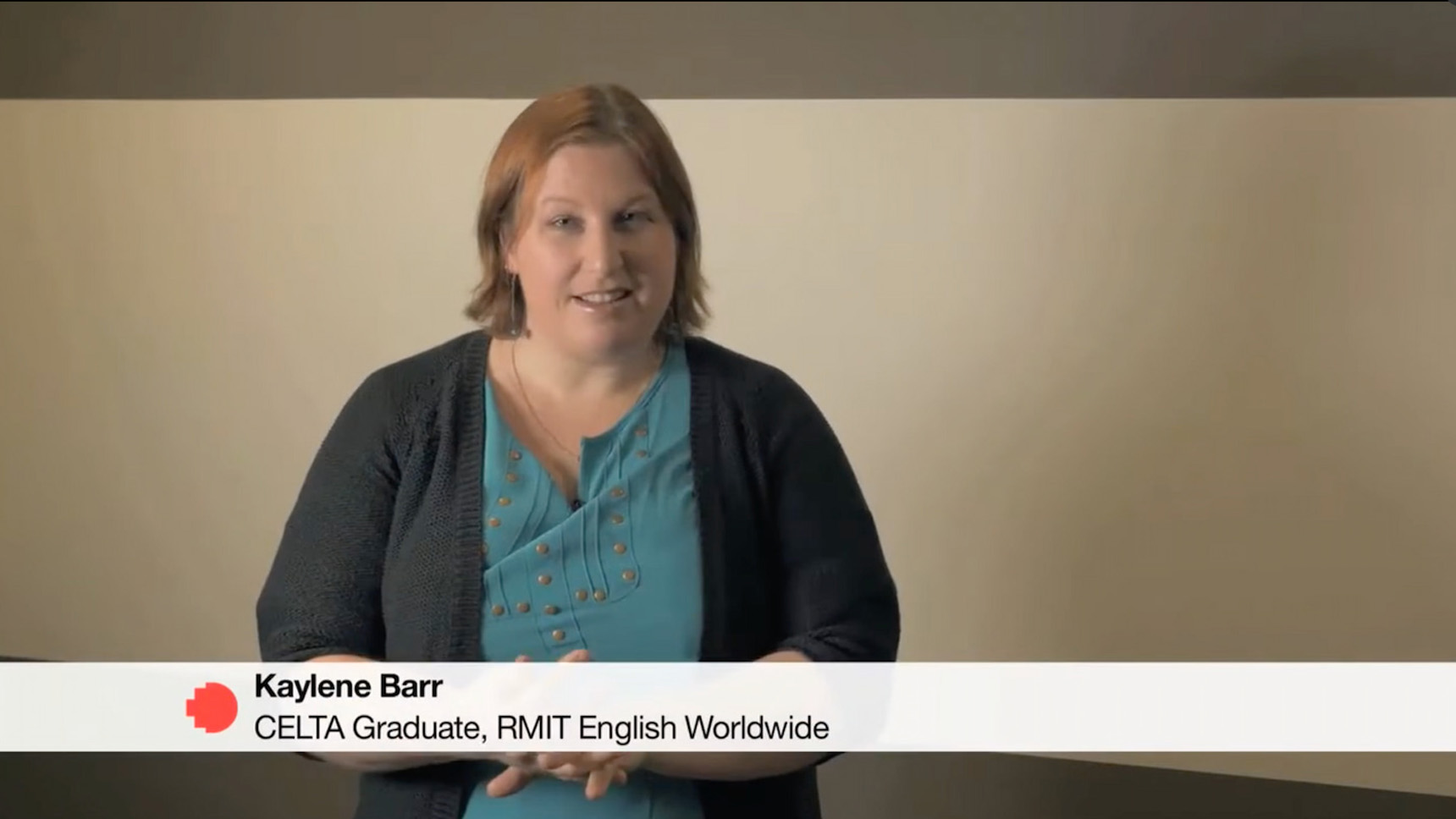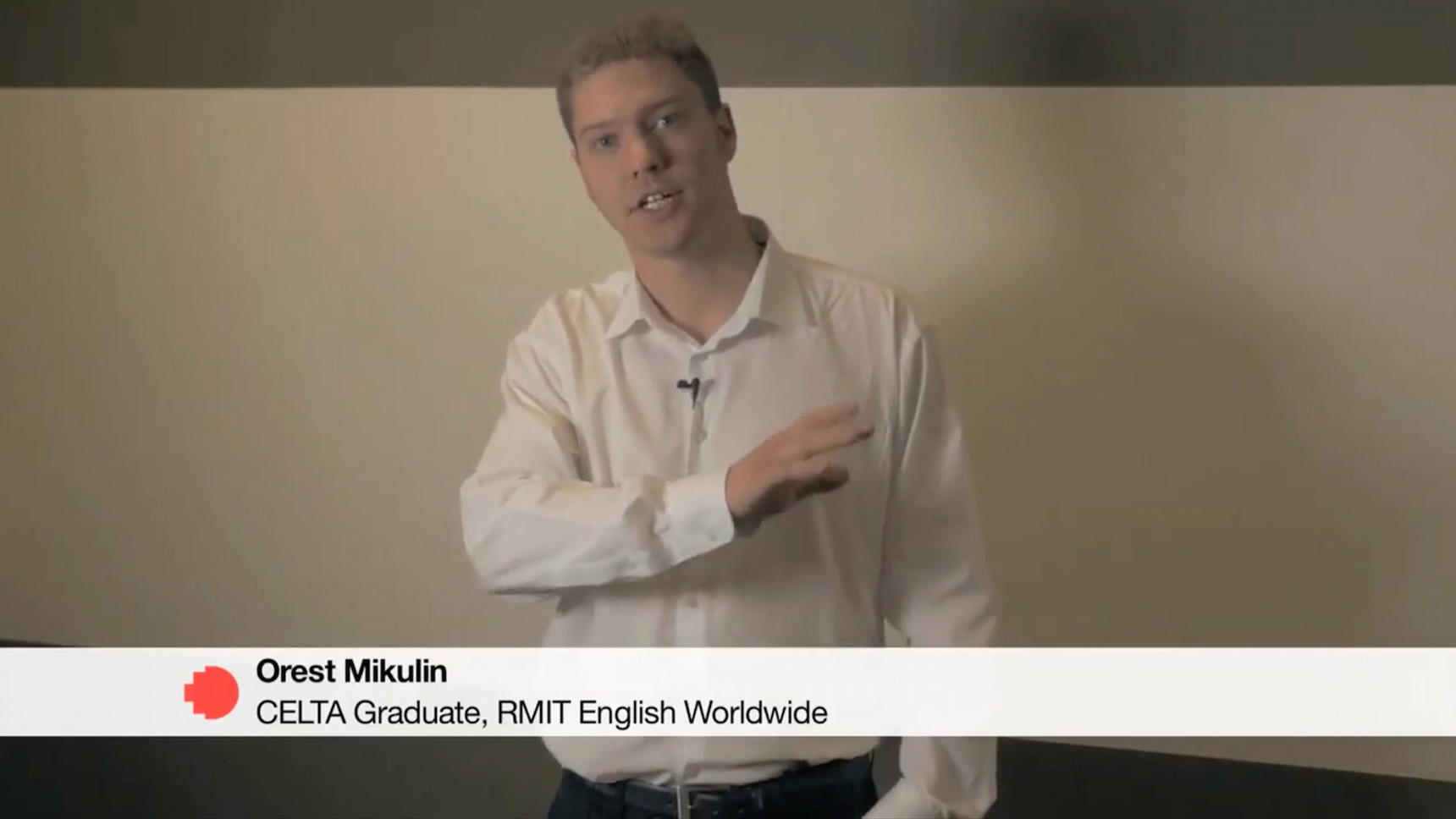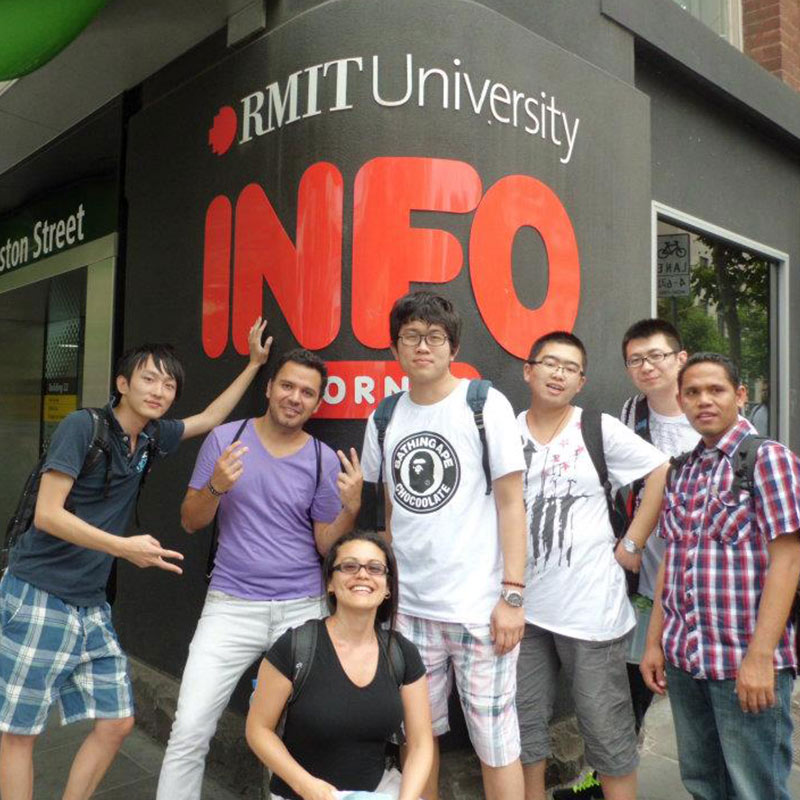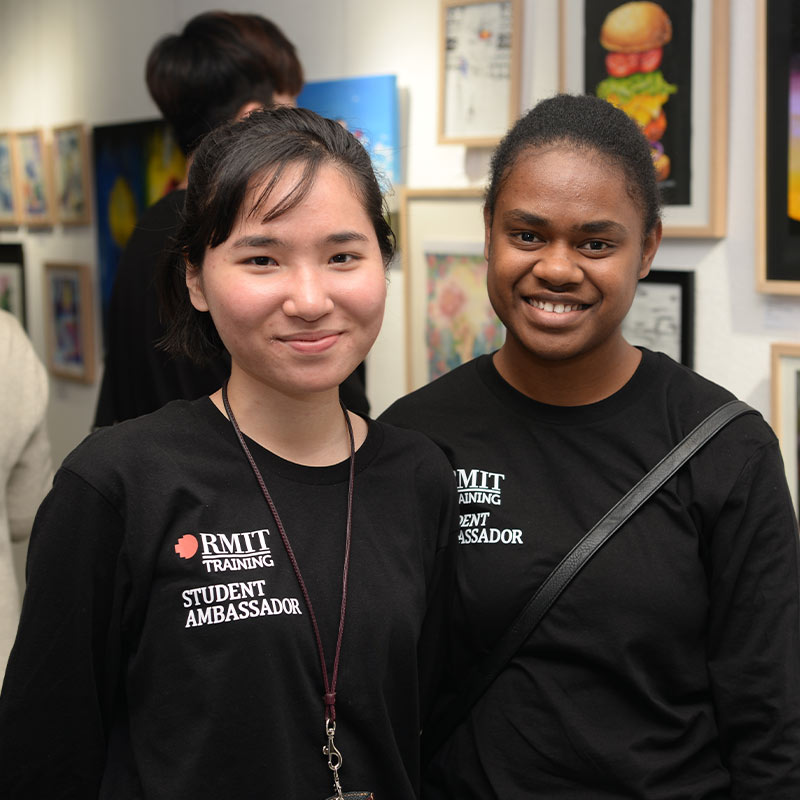- Entry requirements
-
Application dependant
- Duration
-
FT 5 weeks, PT 10 or 15 weeks
- Location
-
Melbourne, Australia or Online
- Tuition fees
-
AU$3,100
- Enrolments
-
See dates below
Overview
The Certificate in English Language Teaching to Adults, known as CELTA, is the most widely recognised pre-service qualification in the world for teachers of English to speakers of other languages.
CELTA is accredited and administered by Cambridge English Language Assessment, part of the University of Cambridge. Once you have completed the course and met the assessment criteria for all written and practical assignments, you will receive a CELTA qualification.
Why study CELTA at RMIT?
CELTA is for people with little or no previous teaching experience. It opens the door to exciting opportunities to teach English all over the world. When you enrol in CELTA with RMIT English Worldwide, we work with you to develop:
Confidence and skills
Skills and confidence in language teaching and classroom management.
Awareness
Improved awareness and understanding of the English language.
English proficiency
Familiarity with methods and materials for developing English language proficiency.
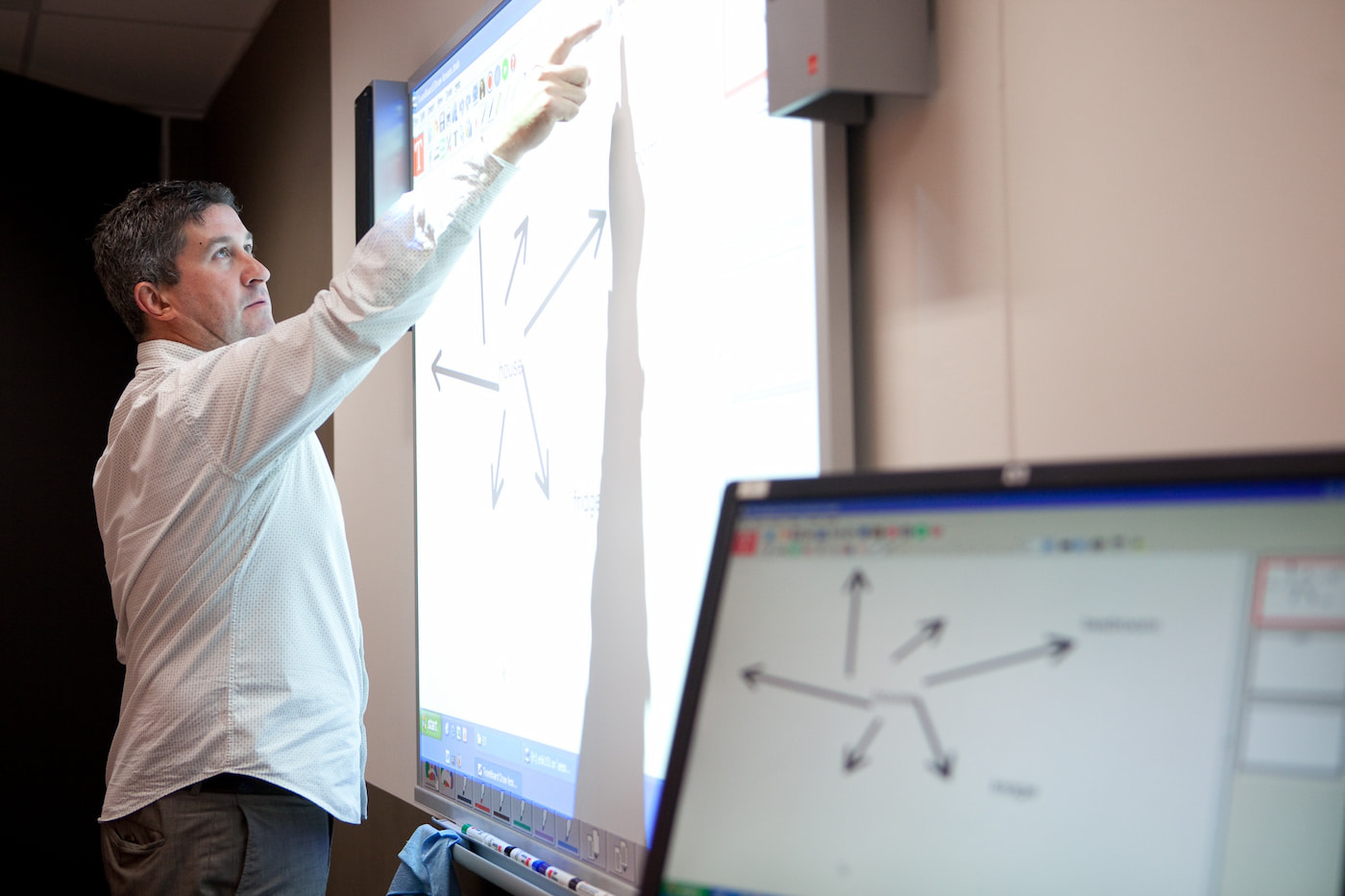
Want to teach English?
If you want to teach English in the classroom environment, CELTA might be the qualification for you.
Watch to learn more about CELTA.
The benefits of CELTA
CELTA graduates are:
- Teaching all over the world
- Making a difference with English having a positive impact on learners’ lives
- Meeting like-minded people who’ve had amazing life experiences
- Enjoying a new career challenge
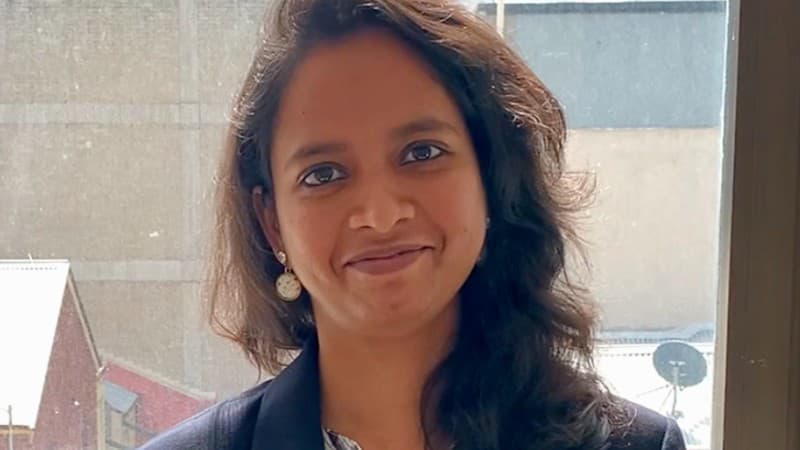
CELTA Alumni testimonial
"Highly recommend this course at RMIT. Teachers here make the entire learning experience so much fun and rewarding. Always grateful to teachers David, Scott and Stephanie for being so helpful."
- Jacqueline D'Cruze, ESL trainer, Masters in English, Bachelor in Education and CELTA
The course is divided into four main areas:
- Awareness of language - introduction to the structure, functions and phonology of the English language
- Methodology - principles, techniques and strategies for communicative language teaching
- Teaching practice - daily, supervised sessions followed by constructive feedback by peers and tutors
- Observation - in the classroom of peers and experienced teachers of different levels of English
CELTA Course subjects
Learners and teachers, and the teaching and learning context
- Understanding the cultural and linguistic backgrounds of learners, and how this might affect their learning of English
- Understanding different learning preferences
Language analysis and awareness
- Understanding key terminology used in English language teaching, applying this terminology in planning and teaching
- Demonstrating a working knowledge of English grammar, lexis and phonology
Language skills: reading, listening, speaking and writing
- Understanding basic concepts and terminology used for describing reading, listening, speaking and writing skills, applying this to teaching
- Understanding how approaches to texts may vary depending on the purpose, making practical use of this in teaching
Planning and resources for different teaching contexts
- Understanding the purpose and principles of planning for effective teaching
- Selecting and planning the kinds of lessons that are most appropriate for particular learners
- Evaluating lesson preparation and reflecting on this for planning future lessons
Developing teaching skills and professionalism
- Effectively organising the classroom, both in terms of layout and pair/group activities
- Making appropriate use of a range of materials and resources
- Involving learners of different ability levels, enabling them to feel a sense of progress
CELTA course requirements
Applicants must:
Be aged 18 years or over (preferably aged 20 or over)
Have completed secondary education in their country of origin
Understand written and spoken English well enough to follow and complete assignments
- Recommended high C1 or low C2 (Council of Europe threshold)
CELTA Course structure
The CELTA course comprises:
Nine teaching practice lessons (total 6 hours)
One-on-one meetings with the tutor to check your progress
Four written assignments
There are a maximum of 18 candidates per course. For each group there is a maximum of six candidates for teaching practice. Candidates give their teaching practice lessons to international students at two different levels of English language proficiency.
RMIT Training offers full-time and part-time face to face, blended (online + face to face) and 100% online CELTA courses.
Full-time CELTA course
The full time course is extremely intensive. Classes are held from 8.30 am to 5.00 pm on Mondays, Tuesdays, Thursdays and Fridays for 5 weeks.
Wednesdays are non contact days. Candidates are expected to use Wednesdays for private study and to attend two 2 hour sessions observing experienced teachers running a class. Wednesdays also replace public holidays.
This is a sample timetable.
| Time | Schedule |
| 8.30–10.00 am | Workshop 1 |
| 10.00–10.15 am | Break |
| 10.15–11.30 am | Workshop 2 |
| 11.30 am –1.00 pm | Lunch break |
| 1.00–3.00 pm | Teaching practice |
| 3.15–4.00 pm | Feedback on teaching practice |
| 4.00–5.00 pm | Lesson preparation/consultation with tutor |
Part time CELTA course
Part-time courses are held from 5.00 pm to 9.00 pm on Mondays and Wednesdays for 15 weeks. Tuesdays replace public holidays. Workshops and input sessions are held on Monday nights and teaching practice and feedback on Wednesdays.
Part-time blended CELTA course
The part-time blended course runs online for 8 weeks followed by 3 weeks face to face teaching practice. Students work on the input sessions at their own pace week-by-week with regular contact online with tutors for the first 8 weeks. Teaching practice takes place face to face from 10am to 12.30pm, Monday to Friday in a three-week block following the online component.
Part-time online CELTA course
The part-time online course runs online for 9 weeks, and both the input and teaching practice is conducted online. The input section is self-directed reading of weekly online units, which will be supplemented by weekly tutor-led meetings. The teaching section runs every Tuesdays and Thursdays from 5pm to 7pm during the 9-week course.
Melbourne CELTA courses for 2024
Start date |
End Date |
Duration |
Mode |
| 23 Oct 2023 | 26 Jan 2024 | 13 weeks (online 23 Oct 2023 - 16 Dec 2023, F2F 2 Jan 2024 - 26 Jan 2024) | Part-time Face-to-Face Input Online |
| 12 Feb 2024 | 15 Mar 2024 | 5 weeks ( Mon, Tues, Thurs & Fri) 9:00am - 5:00pm |
Full-time Face-to-Face Input |
| 19 Feb 2024 | 29 May 2024 | 14 weeks (Mon, Wed) 5:00 - 9:00pm |
Part-time Face-to-Face Input |
| 29 Feb 2024 | 02 May 2024 | 9.5 weeks (Tue, Thurs) 5:00 - 9:00pm |
Part-time Online |
| 03 Jun 2024 | 05 Jul 2024 | 5 weeks ( Mon, Tues, Thurs & Fri) 9:00am - 5:00pm |
Full-time Face-to-Face Input |
| 22 Jul 2024 | 08 Nov 2024 | 16 weeks (Mon, Wed) 5:00 - 9:00pm |
Part-time Face-to-Face Input |
| 25 Jul 2024 | 26 Sept 2024 | 9.5 weeks (Tue, Thurs) 5:00 - 9:00pm |
Part-time Online |
| 21 Oct 2024 | 31 Jan 2025 | 9 weeks ( 21/10/24 – 20/12/2024) 4 weeks ( 06/01 – 31/01/2025) |
Part-time / Online (9 weeks) Face-to-Face Input (4 weeks) |
11 Nov 2024 |
13 Dec 2024 | 5 weeks ( Mon, Tues, Thurs & Fri) 9:00am - 5:00pm |
Full-time Face-to-Face Input |
Hear from our CELTA graduates

Where CELTA can take you - Nenia Malupa
The CELTA qualification can lead to many opportunities. RMIT English Worldwide teacher, Nenia shares her experience.
Meet our CELTA tutors
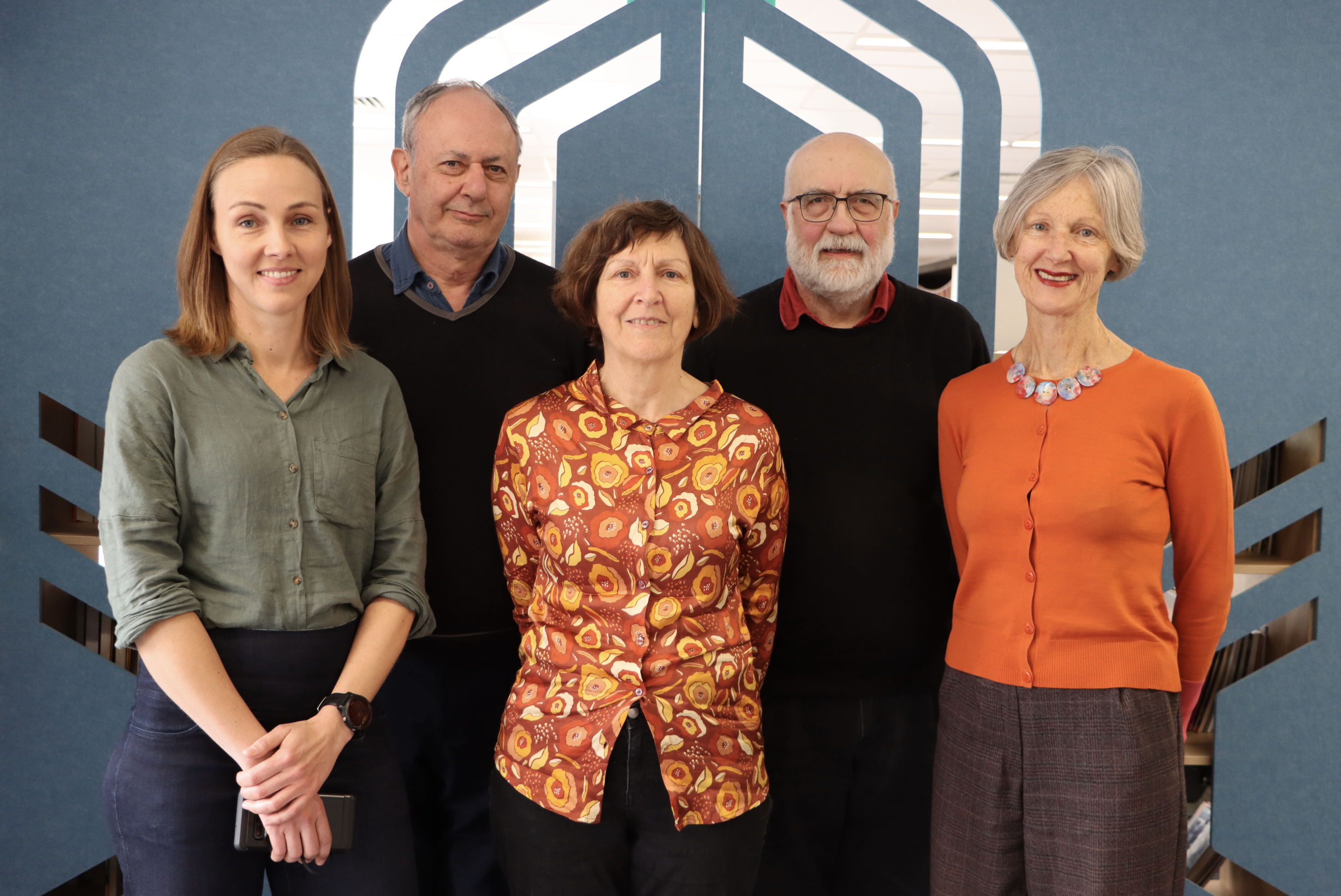
Ronald Barnett (Ron)
Ron is originally from Scotland and has been teaching EFL/ESL since 1981 and a CELTA tutor since 1989. He has worked in the UK, the Middle East (UAE, Saudi Arabia and Libya), the Far East (Hong Kong) and latterly Australia. He has also been a DELTA tutor and holds a degree in English, an MA in TESOL and a CELTA and DELTA.
Ron plays tennis regularly and likes doing cryptic crosswords.
Madeleine (Molly) Young
Molly has been an ESL teacher since 2002. She has taught in Brisbane, Chile and Canada. She has taught learners at all levels from Beginner to Advanced, in General English, Business English and Academic English, including IELTS Preparation classes. She holds a Bachelor of Arts (Spanish), and a Master of Applied Linguistics (TESOL).
Molly loves gardening, travelling and playing Ultimate Frisbee.
Denise Flipo
Denise has been working at REW since her return to Australia from the UAE, where she spent 6 years coordinating, designing and teaching English for Academic Purposes programmes to tertiary students at the University of Wollongong in Dubai. She is also an IELTS examiner, which has taken her to Iran, Oman and Bahrain. She previously taught Japanese in Melbourne and English in Tokushima, Japan. She has a primary teaching diploma, a BA with majors in Japanese and linguistics, an M.Ed in TESOL and a Certificate IV in Assessment and Workplace Training.
Denise’s interests include reading and travelling.
Lynda Beagle
Lynda has been involved in the English language field for more than 30 years as a teacher, teacher trainer, CELTA assessor, Director of Studies and IELTS examiner. She has worked in England, Spain, Australia, Vietnam, China and Costa Rica. She has a Bachelor of Arts, Master of Arts (Applied Linguistics) and Graduate Certificate in Flexible Delivery.
Lynda’s interests include sewing, cooking, gardening and border collies.
Jon Bunce
Jon is originally from the UK and has been an English language teacher for over 30 years.
He is also an experienced CELTA tutor and assessor and holds a CELTA and DELTA, BA
and Master of Arts (Applied Linguistics) and Graduate Certificate in TESOL. He has lived and worked in China, Brunei, the UK and Australia.
Jon has lived in Melbourne for many years now, and his interests include travel, walking, playing music and archery.
Frequently asked questions
Applicants must:
- be aged 18 years or over (preferably aged 20 or over)
- be eligible for tertiary education in their country of origin
- understand written and spoken English well enough to follow and complete assignments.
CELTA is accredited and administered by the University of Cambridge and is a globally recognised qualification. Other courses may not be recognised by international authorities and so could cause problems getting a visa. Shorter courses are unlikely to meet the National ELICOS Standards of a minimum of 100 contact hours and 6 hours of supervised, assessed teaching practice for teachers in Australian institutions.
Your certificate, issued by Cambridge English Language Assessment, will be accompanied by a report issued in the name of the university or college where you train. A reputable institution with global recognition will open more doors for you.
The application process includes a pre-interview language task (see the CELTA online application form) and an interview. These are used to assess your ability to complete the course successfully and your commitment to its intensive schedule.
Not every applicant is offered a place. CELTA candidates are selected based on their performance in a pre-interview language task and interview. Our expert trainers will assess your application and interview to see if you have the potential to succeed in this demanding course.
The focus of CELTA is on teaching you to teach, not teaching you grammar. This is why the application process is so important, and why we may recommend you take our Grammar Fundamentals short course before you start.
CELTA is for teachers who want to teach English to students in their home country or overseas. TEFL, however, is only an entry-level English teaching certification covering basic teacher training to teach non-native English speakers overseas.
Applicants should:
- Consider doing our Grammar Fundamentals course first. Comprising four evening classes over two weeks, this course will help you brush up on grammar terminology and work out what skills you need to develop.
- Be prepared to be very busy when the course starts. People who have studied CELTA say, ‘You won’t have time to do anything else’. Believe them. It’s true. If you want to do the full-time course, you won’t even have time for a part-time job. If you cannot take time off work, then do the part-time course.
- Let your friends and family know you’ll be busy. Suspend your gym membership, tell your book club you’ll be absent etc.
- Get organised. Make sure you have all the books and stationery you’ll need.
- Set aside a space at home where you can prepare lessons in peace.
- Talk to someone who has done a CELTA course. It helps to hear other people’s stories and get their advice.
There are several places to start your job search as a CELTA graduate, including:
After the course, CELTA graduates will be able to work as an English language teacher to adults anywhere in the world. Employment opportunities are usually on a casual basis. Towards the end of the course, there is a session on future pathways in which tutors offer help and guidance for finding work.
Information for new students
Everything you need to know for your first few weeks at RMIT including enrolment information, timetables and orientation.
Student services
Explore the services, activities and support available to you as a student.
Campus tour
Do you want to see where you could be studying? We have put together a virtual campus tour.

